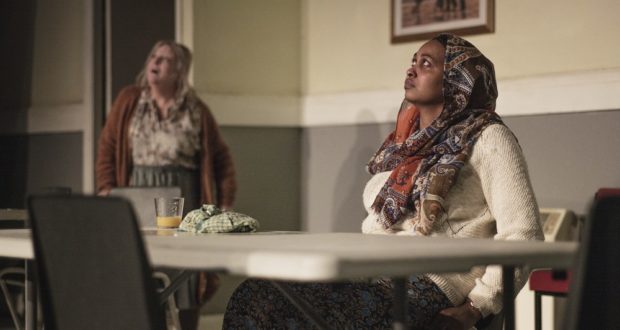Pros: A gripping story, outstanding performances by an impressive cast, and a burning social issue that should be a priority in every politician’s agenda.
Cons: none
Moving, heartbreaking and beautiful play about four different cases of people who are homeless and have to live in temporary accommodation provided by the council.Summary
Rating
Unmissable!
A woman dressed in a thawb (Mimi Malaz Bashir) puts the kettle on in a half-lit dining room. The boiling sound is soothing, and reminds us of the routine that many people follow at home every morning. The difference here is that this woman – her name is Tharwa – can hardly call this place a home: she’s living in a homeless hostel.
Soon we meet the other lodgers: flat 4 is inhabited by Barbara (Anna Calder-Marshall), an elderly and fragile woman, and Colin (Nick Holder), her middle-aged son and carer. They have been living in the hostel for more than a year. Next to them is flat 5, a young family of four and soon to become five as Emma’s (Janet Etuk) baby is on the way. Then is Adnan, the Syrian teacher of flat number 8.
As the play unfolds we learn about the characters’ past and how they ended up here. The family in flat 5 became homeless when their landlord evicted them after raising a rent they could no longer afford. Dean (Luke Clarke), who lost his job, tries hard to reassure his wife and kids that everything will be all right and soon they will get permanent housing from the council.
Both parents are keen to continue life as usual for their two young kids (Yonatan Pelé Roodner and Emily Beacock/Rosanna Beacock); they set up the table for each meal, play games, wash the dishes and clean around. But it becomes increasingly hard to pretend that everything is all right when the kids don’t have enough food for breakfast and go hungry to bed at night. Dean goes to the food bank and both he and Emma have a smaller share so their kids can eat one more bite.
Frustration and hopelessness soon sink in like poison, and the resentment created by an unfair system is vented on the others who are in a similar situation. Tharwa accuses Emma of stealing her crockery; Emma has an outburst with Colin when she finds out that him and his mother might get a flat sooner than her family. However, in LOVE solidarity and hope ultimately reign, and it’s clear for the characters that they are all victims to the same injustice.
There are certain requirements to qualify for emergency housing from the council: either be immediately homeless, have a priority need for housing (for example, if you are pregnant or classed as ‘vulnerable’) or meet the immigration and residence rules. Still, not every homeless person is entitled to emergency housing – a sad reality seen everyday in the streets of London.
LOVE shows four different stories of people who are on one of the ‘qualifying’ requirements for emergency housing. The immersive nature of the show, where actors walk between the audience and sit next to us, gives a vivid reminder that it could be our next door neighbour, family or us who are in the same situation. Losing your job, a greedy landlord raising an unaffordable rent, war… events that might change your life or that of loved ones from one day to another, and deprive you of a roof above your head.
Alexander Zeldin’s LOVE is a beautiful, deeply moving and heartbreaking play we all should see. It awakes anger towards a cruel system and society where the richest 1% have seen their share increase to nearly a quarter of all the country’s wealth, while the poorest half have less than 5%. But it also sends a positive and hopeful message, where love and solidarity achieve much more than hate. That’s why it’s LOVE, after all.
Written and Directed by: Alexander Zeldin
Produced by: The National Theatre and Birmingham Repertory Theatre
Booking Until: This show has completed its current run
 Everything Theatre Reviews, interviews and news for theatre lovers, London and beyond
Everything Theatre Reviews, interviews and news for theatre lovers, London and beyond



